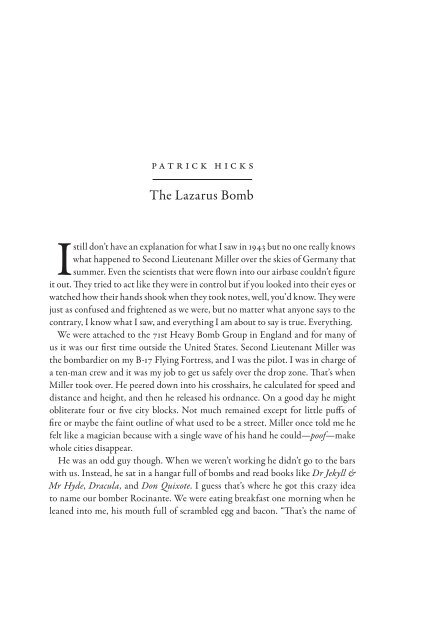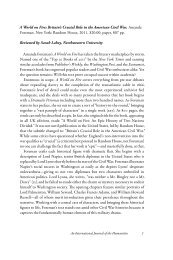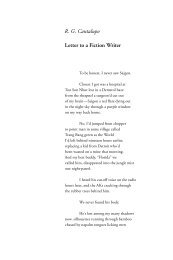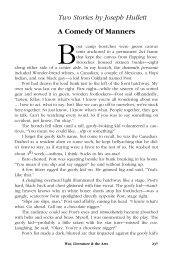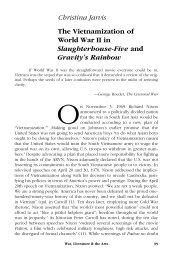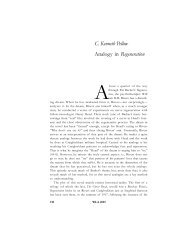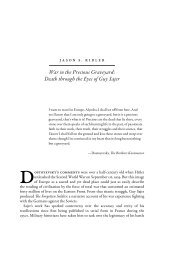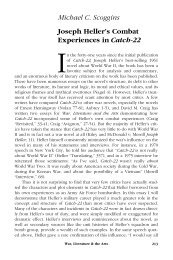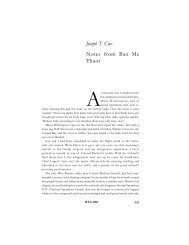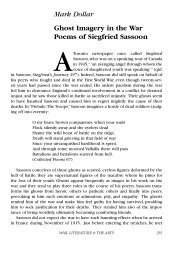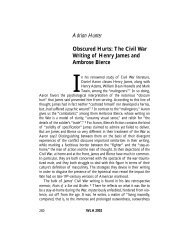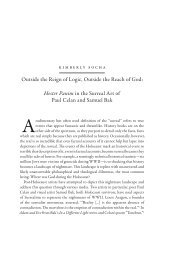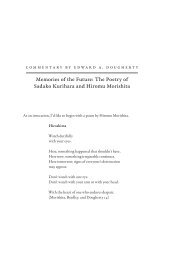The Lazarus Bomb - War, Literature and the Arts
The Lazarus Bomb - War, Literature and the Arts
The Lazarus Bomb - War, Literature and the Arts
Create successful ePaper yourself
Turn your PDF publications into a flip-book with our unique Google optimized e-Paper software.
P A T R I C K H I C K S<br />
<strong>The</strong> <strong>Lazarus</strong> <strong>Bomb</strong><br />
I<br />
still don’t have an explanation for what I saw in 1943 but no one really knows<br />
what happened to Second Lieutenant Miller over <strong>the</strong> skies of Germany that<br />
summer. Even <strong>the</strong> scientists that were flown into our airbase couldn’t figure<br />
it out. <strong>The</strong>y tried to act like <strong>the</strong>y were in control but if you looked into <strong>the</strong>ir eyes or<br />
watched how <strong>the</strong>ir h<strong>and</strong>s shook when <strong>the</strong>y took notes, well, you’d know. <strong>The</strong>y were<br />
just as confused <strong>and</strong> frightened as we were, but no matter what anyone says to <strong>the</strong><br />
contrary, I know what I saw, <strong>and</strong> everything I am about to say is true. Everything.<br />
We were attached to <strong>the</strong> 71st Heavy <strong>Bomb</strong> Group in Engl<strong>and</strong> <strong>and</strong> for many of<br />
us it was our first time outside <strong>the</strong> United States. Second Lieutenant Miller was<br />
<strong>the</strong> bombardier on my B-17 Flying Fortress, <strong>and</strong> I was <strong>the</strong> pilot. I was in charge of<br />
a ten-man crew <strong>and</strong> it was my job to get us safely over <strong>the</strong> drop zone. That’s when<br />
Miller took over. He peered down into his crosshairs, he calculated for speed <strong>and</strong><br />
distance <strong>and</strong> height, <strong>and</strong> <strong>the</strong>n he released his ordnance. On a good day he might<br />
obliterate four or five city blocks. Not much remained except for little puffs of<br />
fire or maybe <strong>the</strong> faint outline of what used to be a street. Miller once told me he<br />
felt like a magician because with a single wave of his h<strong>and</strong> he could—poof—make<br />
whole cities disappear.<br />
He was an odd guy though. When we weren’t working he didn’t go to <strong>the</strong> bars<br />
with us. Instead, he sat in a hangar full of bombs <strong>and</strong> read books like Dr Jekyll &<br />
Mr Hyde, Dracula, <strong>and</strong> Don Quixote. I guess that’s where he got this crazy idea<br />
to name our bomber Rocinante. We were eating breakfast one morning when he<br />
leaned into me, his mouth full of scrambled egg <strong>and</strong> bacon. “That’s <strong>the</strong> name of
Don Quixote’s horse,” he swallowed. He shoveled in ano<strong>the</strong>r forkful. “It’s a quality<br />
name. You maybe want me to paint something on <strong>the</strong> side of our 17?”<br />
So he got himself a few cans of paint <strong>and</strong> a stepladder, <strong>and</strong> he hummed <strong>and</strong><br />
whistled as he created this Pegasus on <strong>the</strong> side of our plane throwing bombs at a<br />
windmill. <strong>The</strong> white horse had a chest plate of armor <strong>and</strong> its fea<strong>the</strong>red wings were<br />
all highly detailed—“she’ll keep us safe,” he sang from <strong>the</strong> top rung—<strong>and</strong> <strong>the</strong>n he<br />
painted all <strong>the</strong>se bombs into a saddle. Down in <strong>the</strong> corner <strong>the</strong>re was a windmill,<br />
but instead of four wooden arms paddling <strong>the</strong> air it had a rotating swastika. Above<br />
<strong>the</strong> entire painting was <strong>the</strong> single word: Rocinante. It was so well done that a<br />
photojournalist from Life Magazine had us line up beneath <strong>the</strong> painting <strong>and</strong> smile.<br />
We wore our dress uniforms <strong>and</strong> wondered what we’d look like to everyone back<br />
in America. We saluted <strong>the</strong> camera. We gave <strong>the</strong> thumbs-up sign. We waved to our<br />
mo<strong>the</strong>rs.<br />
“She’ll bring us good luck,” Miller said patting my shoulder. “You wait <strong>and</strong> see,<br />
Captain. Rocinante will keep us safe.”<br />
And maybe she did keep us safe. We were all superstitious back <strong>the</strong>n so who<br />
knows what’s what about <strong>the</strong> truth. With so much death orbiting around us <strong>and</strong> so<br />
many incomprehensible images of bombers breaking apart <strong>and</strong> being sucked from<br />
<strong>the</strong> skies…well, I guess a spirit world just felt closer to us. Thous<strong>and</strong>s of ghosts were<br />
created every time we lifted into <strong>the</strong> sky. Buildings melted, factories boiled in fire,<br />
people disappeared. Voodoo magic happened every day <strong>and</strong> <strong>the</strong> devil rose out of<br />
<strong>the</strong> ground.<br />
We never talked about dying because that was tempting fate but all of us had<br />
good luck charms <strong>and</strong> private rituals that kept evil from reaching into our B-17.<br />
Whenever I climbed into <strong>the</strong> cockpit I always wore a rosary that had been blessed<br />
by an archbishop back in Minneapolis, but o<strong>the</strong>r guys had things like rabbits’ feet,<br />
or four-leaf clovers, or horseshoes, or locks of hair. Our navigator had a lucky pencil.<br />
My co-pilot scratched his name into a bullet <strong>and</strong> convinced himself he’d come out<br />
of <strong>the</strong> show alive. And you know what? He did. When Edmund Deering finally<br />
died of a pulmonary fibrosis in 1998 he still had that bullet with his name scratched<br />
on it. <strong>The</strong>y put it in a tiny box <strong>and</strong> buried it with him.<br />
Second Lieutenant Miller also had his private charms <strong>and</strong> rituals. <strong>The</strong> scientists,<br />
those egghead types from Oxford <strong>and</strong> Cambridge <strong>and</strong> Harvard, wanted to know<br />
if <strong>the</strong>se things somehow influenced “<strong>The</strong> Event”, as <strong>the</strong>y called it in <strong>the</strong>ir official<br />
reports. <strong>The</strong>y tried to connect Miller’s goofy rituals with what happened on June<br />
27, 1943. Maybe it affected his bombs somehow, I don’t know, but I do know that<br />
he always took his bubblegum out of his mouth before every run. He pressed it<br />
x <strong>War</strong>, <strong>Literature</strong> & <strong>the</strong> <strong>Arts</strong>
against <strong>the</strong> same spot on one of <strong>the</strong> crossbeams, he hunched over his scope <strong>and</strong><br />
<strong>the</strong>n—after he dropped what he came to drop, after all those seeds of death had<br />
tumbled to <strong>the</strong> ground—he popped his gum back into his mouth. He never said<br />
“bombs away” like he was supposed to, he yelled “boom!” as loud as he could over<br />
<strong>the</strong> flight intercom. It was a yip of joy.<br />
“Boom! No more not-sees, boys!”<br />
That’s ano<strong>the</strong>r thing. He never called <strong>the</strong>m civilians or Krauts. He called <strong>the</strong><br />
people on <strong>the</strong> streets <strong>and</strong> hiding in <strong>the</strong> bomb shelters not-sees because he liked <strong>the</strong><br />
play on words.<br />
“I’m a goddamn magician, boys! Now you see <strong>the</strong>m, now you don’t!”<br />
Miller was good at what he did. <strong>The</strong>re was only one spot in <strong>the</strong> whole big sky<br />
where he could release his bombs accurately <strong>and</strong> I never saw him miss that little<br />
trapdoor of air. Not once. I mean, <strong>the</strong> man knew his explosives like <strong>the</strong>y were his<br />
own children <strong>and</strong> he sometimes gave names to his bombs. Sometimes, back at base,<br />
while <strong>the</strong> rest of us were relaxing in our Nissan huts <strong>and</strong> listening to <strong>the</strong> BBC or<br />
playing blackjack or whatever, he was out in a hangar studying bombs. He looked<br />
at firing pins <strong>and</strong> detonation fuses <strong>and</strong> oiled gears. He knew all about racks <strong>and</strong><br />
linkages <strong>and</strong> switches, <strong>and</strong> he especially knew about <strong>the</strong> electricity that pulsed<br />
from his thumb to <strong>the</strong> releasing pins. He considered survivability in relationship<br />
to blast radius <strong>and</strong> he made up all <strong>the</strong>se elaborate charts where he calculated what<br />
would happen to <strong>the</strong> human body at 25 feet or 50 feet or 100 feet. Shock waves,<br />
shrapnel, <strong>and</strong> fire could blast a person into fleshy confetti at 15 feet or, if <strong>the</strong>y were<br />
st<strong>and</strong>ing fur<strong>the</strong>r away (maybe around a corner or something) it might only shatter<br />
<strong>the</strong> delicate bones that kept <strong>the</strong>ir ear working. Miller said he wanted to underst<strong>and</strong><br />
what was happening on <strong>the</strong> ground <strong>and</strong> he started to loose sleep. His firing thumb<br />
began to twitch on its own, like it was doing its own thinking <strong>and</strong> didn’t belong to<br />
him anymore.<br />
I asked Miller if he was okay one night, if he needed anything. He looked at <strong>the</strong><br />
stars <strong>and</strong> shook his head very slowly. He lit a cigarette <strong>and</strong> asked what it would be<br />
like to fall 30,000 feet.<br />
“That’s how far my babies drop.” He looked at <strong>the</strong> stars <strong>and</strong> acted like I wasn’t<br />
<strong>the</strong>re. “It takes seven minutes to fall from that high up, <strong>and</strong> you’re going 120 miles<br />
per hour when you hit <strong>the</strong> ground. Think you’d scream all <strong>the</strong> way down?”<br />
<strong>The</strong>n he walked into <strong>the</strong> dark. <strong>The</strong> little red ball of his cigarette fell away from me,<br />
it winked out into <strong>the</strong> night. Swallowed whole.<br />
An International Journal of <strong>the</strong> Humanities x
“<strong>The</strong> Event” happened on our thirteenth mission. We knew it would be a bad<br />
hop over Krautl<strong>and</strong> because our planes were given a full load of explosives <strong>and</strong><br />
fuel. When we woke up, <strong>the</strong> stink of gasoline saturated <strong>the</strong> air, it crawled into our<br />
noses, it made us think twice about lighting cigarettes. Plus <strong>the</strong>re was that spooky<br />
number: thirteen. It filled my heart with spiders.<br />
<strong>The</strong> morning of June 27 was like any o<strong>the</strong>r day of <strong>the</strong> war. All <strong>the</strong> pilots, co-pilots,<br />
<strong>and</strong> bombardiers crowded into a Nissan hut where, on a large map, we were given<br />
<strong>the</strong> target. We would be running over a city called Kiel because that’s where <strong>the</strong><br />
Nazis built <strong>the</strong>ir U-Boats. <strong>The</strong> concrete bunkers were easy enough to locate <strong>and</strong> we<br />
were told to expect moderate to heavy flak. Major Gillespie gave this information<br />
like it was a wea<strong>the</strong>r report, like we might encounter hail or some o<strong>the</strong>r minor<br />
inconvenience on our way to work.<br />
<strong>The</strong>re were trays of hard-boiled eggs for us to grab on our way out. Deering <strong>and</strong> I<br />
filled out pockets for <strong>the</strong> long haul ahead <strong>and</strong> talked about <strong>the</strong>se impossible rumors<br />
of slave labor we’d heard. Was it true <strong>the</strong> Nazis were forcing Jews to build U-Boats?<br />
We walked towards Rocinante <strong>and</strong> shrugged our shoulders. What could be done<br />
about it even it if were true? We were at war...c’est la vie…we had to suck it up <strong>and</strong><br />
fly on.<br />
Second Lieutenant Miller inspected his bombs. <strong>The</strong> 500-pounders <strong>and</strong><br />
1000-pounders that morning looked normal <strong>and</strong> <strong>the</strong>re was nothing really odd<br />
about <strong>the</strong>m. <strong>The</strong> scientists would later find this hard to believe but I know it’s true<br />
because I was <strong>the</strong>re with Miller. I checked <strong>the</strong> bombs myself.<br />
“Looks fine to me,” he said. He gave me a limp salute <strong>and</strong> crawled into Rocinante<br />
with a pack of gum. <strong>The</strong> o<strong>the</strong>r men got out <strong>the</strong>ir good luck charms <strong>and</strong> some of<br />
<strong>the</strong>m patted <strong>the</strong> Pegasus on <strong>the</strong> side of our plane. And as each man entered <strong>the</strong><br />
fuselage, Miller asked if anyone wanted a stick of gum. This was all pure ritual <strong>and</strong><br />
it made us feel that it was just ano<strong>the</strong>r day at <strong>the</strong> office, just a training flight or an<br />
easy run up <strong>the</strong> coast. I got into my seat <strong>and</strong> moved <strong>the</strong> yoke in a circle to check <strong>the</strong><br />
flaps. <strong>The</strong> cockpit smelled of grease <strong>and</strong> cold metal <strong>and</strong>, when <strong>the</strong> engines coughed<br />
to spewing smoky life, I looked at my reflection in <strong>the</strong> window. <strong>The</strong> whole plane<br />
shook like it was afraid.<br />
Soon, <strong>the</strong> whole bomb group lifted into <strong>the</strong> air <strong>and</strong> we were over <strong>the</strong> English<br />
Channel. It was a vibrating <strong>and</strong> deafening environment up <strong>the</strong>re. Cold too. I’m<br />
from Minnesota so I know a few things about subzero temperature but at 32,000<br />
feet it’s -40°. Spit froze in my oxygen mask. My blood turned to slush. Frostbite<br />
nibbled my fingers. And <strong>the</strong>n, just when I was beginning to lose feeling in my whole<br />
body <strong>and</strong> wishing for something to break <strong>the</strong> monotony of <strong>the</strong> droning engines,<br />
x <strong>War</strong>, <strong>Literature</strong> & <strong>the</strong> <strong>Arts</strong>
<strong>the</strong> sky filled up with swastikas. Little fighter planes swarmed around our bomb<br />
group <strong>and</strong> <strong>the</strong>y opened up <strong>the</strong>ir machine guns—hot streaks of orange snapped<br />
through <strong>the</strong> air, invisible metal punched into engines <strong>and</strong> glass <strong>and</strong> bodies—that’s<br />
when bad things began to happen, fast. <strong>The</strong> Irish Rose lost both wings <strong>and</strong> folded<br />
in on herself. A burst of yellow flame licked out from <strong>the</strong> cockpit <strong>and</strong> I saw men<br />
jump out, <strong>the</strong>y fell like fleas <strong>and</strong> <strong>the</strong>ir parachutes bubbled with fire. When <strong>the</strong> King<br />
Bee was hit <strong>the</strong>re was a puff of debris but no fire at all, <strong>the</strong>re was just an eruption of<br />
metal <strong>and</strong> <strong>the</strong>n a slow curling into <strong>the</strong> ground, like <strong>the</strong> whole plane had decided to<br />
take a nap. Meanwhile our waist gunners were shouting out enemy positions. Three<br />
o’clock! Nine o’clock! Watch out for seven!<br />
I saw a man fall out of <strong>the</strong> Careful Virgin. His chute dribbled behind him like a<br />
weak exclamation point <strong>and</strong> I swear to Christ he was reading a book. Maybe it was<br />
<strong>the</strong> Bible? All I know is that he was traveling at 120 miles per hour <strong>and</strong> he’d hit <strong>the</strong><br />
ground in seven minutes. I watched him for awhile <strong>and</strong> his chute never opened, he<br />
just became smaller <strong>and</strong> smaller.<br />
“Target ahead,” Miller said through static. His voice was calm <strong>and</strong> focused like<br />
all of this was perfectly normal. <strong>The</strong> 17s ahead flew into clouds of black flak <strong>and</strong> it<br />
made <strong>the</strong> air bumpy, like we were riding over rocks <strong>and</strong> potholes. Chunks of metal<br />
began to chink into Rocinante as if somebody were throwing sacks of holes at our<br />
plane. Up ahead, bombs began to fall <strong>and</strong> I watched concussion rings blast out over<br />
Kiel’s harbor. A thunderstorm of fire popped up from <strong>the</strong> ground, it looked like a<br />
jagged line of fiery flowers, <strong>and</strong> I could tell <strong>the</strong> boys ahead put <strong>the</strong>ir ordnance right<br />
in <strong>the</strong> pickle barrel. <strong>The</strong>re wouldn’t be much left for us to hit.<br />
I switched control of <strong>the</strong> plane over to Miller. “She’s yours.”<br />
He pressed his bubblegum against <strong>the</strong> crossbeam <strong>and</strong> hunched over his bomb<br />
site. I felt us pitch <strong>and</strong> yaw as he adjusted our course heading. Up. Down. Steady.<br />
Up. Up. Steady. When <strong>the</strong> bombs were finally dropped, Rocinante lurched into <strong>the</strong><br />
air suddenly lighter <strong>and</strong> Miller yelled that one word we all wanted to hear because<br />
it meant that we could fly home.<br />
“Boom!” he shouted. “Boom! Boom!”<br />
What happened next became <strong>the</strong> subject of many debriefings <strong>and</strong> classified<br />
reports but in spite of all that paperwork I still don’t know how to properly explain<br />
it. <strong>The</strong>re wasn’t much left of Kiel when we unloaded our bombs, that’s for sure. <strong>The</strong><br />
harbor was on fire with black oily clouds <strong>and</strong> I could see <strong>the</strong> skeletons of buildings<br />
collapsing into <strong>the</strong>mselves, but when our bombs hit <strong>the</strong> ground <strong>the</strong> colors weren’t<br />
right. Each of our bombs was a brilliant globe of light that swelled for a few seconds<br />
<strong>and</strong> <strong>the</strong>n winked out. It was like we dropped pearls of heat onto <strong>the</strong> ground.<br />
An International Journal of <strong>the</strong> Humanities x
“What’s that?” Miller shouted. He touched <strong>the</strong> nosecone with both h<strong>and</strong>s <strong>and</strong><br />
stopped chewing his gum. “What <strong>the</strong> hell’s that?”<br />
Far below, amid <strong>the</strong> inferno <strong>the</strong> 71st <strong>Bomb</strong> Group had just created, <strong>the</strong>re were<br />
puddles of fireless calm, like a stillness had decided to pock <strong>the</strong> burning ground.<br />
<strong>The</strong> buildings looked undamaged, destruction raged <strong>and</strong> cracked around <strong>the</strong>m but<br />
inside <strong>the</strong> little circles of our bomb blasts <strong>the</strong>re was nothing but peace. <strong>The</strong>re’s no<br />
o<strong>the</strong>r way to describe it: It looked like our B-17 had blasted <strong>the</strong> harbor with life,<br />
not with death.<br />
As we turned back towards Engl<strong>and</strong> we said nothing to each o<strong>the</strong>r. Miller stared<br />
out <strong>the</strong> nosecone <strong>and</strong> didn’t move. When we l<strong>and</strong>ed, he just sat <strong>the</strong>re, thinking.<br />
He came to <strong>the</strong> conclusion that it was some kind of super weapon. After all, new<br />
technology came out of warfare all <strong>the</strong> time, <strong>and</strong> didn’t <strong>the</strong> last World <strong>War</strong> create<br />
submarines <strong>and</strong> tanks <strong>and</strong> flame-throwers <strong>and</strong> mustard gas? Maybe <strong>the</strong>se bombs<br />
were some kind of new military hocus-pocus?<br />
Major Gillespie ordered us into his office <strong>and</strong> closed <strong>the</strong> door. He talked in<br />
hushed tones. Reports were written, Rocinante was studied <strong>and</strong> Second Lieutenant<br />
Miller was interviewed by scads of brass. And <strong>the</strong>n my co-pilot <strong>and</strong> I were taken for<br />
a long drive with Major Gillespie. He motored through villages called Plumpton,<br />
Broomer’s Corner, <strong>and</strong> Wisborough Green. Thatch roofs <strong>and</strong> leafy trees flicked by<br />
<strong>the</strong> windows. <strong>The</strong> sun was a dull white circle <strong>and</strong> <strong>the</strong> air was hazy, full of pollen. We<br />
talked about home <strong>and</strong> <strong>the</strong>n, after zigzagging down gritty roads that pinged rocks<br />
off <strong>the</strong> undercarriage of <strong>the</strong> car, Major Gillespie pulled into a field, he turned off<br />
<strong>the</strong> engine <strong>and</strong> took out a pipe. He wanted to hear <strong>the</strong> whole story again, off <strong>the</strong><br />
record, so Deering <strong>and</strong> I told him once again what we knew.<br />
Gillespie nodded <strong>and</strong> tweaked his nose. He mentioned that spies in Kiel had<br />
managed to visit <strong>the</strong> bombsite. <strong>The</strong>ir reports were full of <strong>the</strong>se unbelievable<br />
accounts of buildings that had been reassembled from rubble, trees were made<br />
whole again from splinters, anything scorched by fire was unburned.<br />
“It’s an impossible story of course,” Gillespie said relighting his pipe. “<strong>The</strong>y’re<br />
saying that everything inside <strong>the</strong> blast radius of your bombs has been brought back<br />
to life. Some kind of Kraut propag<strong>and</strong>a, no doubt.”<br />
“I don’t follow, sir,” Deering said.<br />
Gillespie stared out <strong>the</strong> window <strong>and</strong> cleared his throat. He went on to say that—<br />
according to <strong>the</strong> report, which he hardly believed—people had been brought back<br />
to life. Anyone that was dead was now alive. It made Gillespie chuckle. “<strong>The</strong>se<br />
are being called ‘<strong>Lazarus</strong> <strong>Bomb</strong>s’ by <strong>the</strong> Germans. But look, I need both of you<br />
x <strong>War</strong>, <strong>Literature</strong> & <strong>the</strong> <strong>Arts</strong>
to ignore <strong>the</strong>se fantastic reports <strong>and</strong> stay on target. We’re at war so don’t believe<br />
everything you hear…just get your job done, okay?”<br />
Over Hamburg <strong>and</strong> Cologne our bombs did exactly <strong>the</strong> same thing. Instead of<br />
fire <strong>the</strong>re was a flash of white. Everything looked peaceful, untouched, fresh, like<br />
<strong>the</strong> Garden of Eden had bloomed to life again, <strong>and</strong> it didn’t matter what bombs we<br />
used or what <strong>the</strong> wea<strong>the</strong>r was like or what city we were attacking. Rubble jumped<br />
up <strong>and</strong> reshaped itself into buildings, bridges knitted <strong>the</strong>mselves toge<strong>the</strong>r, fires<br />
crouched down into little sparks <strong>and</strong> puffed into nothingness. When we were<br />
flying back from Cologne, Miller asked about people being brought back to life.<br />
“You think that’s true?” he asked chewing his gum. “Think my bombs are doing<br />
that?”<br />
“Don’t be stupid,” I said over <strong>the</strong> intercom. “Can’t be true.”<br />
But privately I wasn’t so sure.<br />
Miller moved his bunk into <strong>the</strong> bomb hangar <strong>and</strong> started doing really crazy<br />
things like blessing 1000-pounders. He sprinkled water on <strong>the</strong>ir tailfins <strong>and</strong> made<br />
<strong>the</strong> sign of <strong>the</strong> cross over huge stacks of explosives. He slept with firing mechanisms<br />
like <strong>the</strong>y were teddy bears <strong>and</strong> I had to remind <strong>the</strong> guy to brush his teeth, <strong>and</strong> finish<br />
<strong>the</strong> mutton on his plate, <strong>and</strong> shave. I began to feel like his mo<strong>the</strong>r.<br />
A team of scientists was brought in from a place called Bletchley Park <strong>and</strong> <strong>the</strong>y<br />
studied Miller for a week, <strong>the</strong>y gave him all <strong>the</strong>se psychological tests, <strong>the</strong>n we were<br />
told to bomb some insignificant podunk village on <strong>the</strong> coast of Germany. We<br />
didn’t know it at <strong>the</strong> time but this place had been flamed off <strong>the</strong> map two days<br />
earlier because <strong>the</strong>y wanted to see what would happen when we arrived with our<br />
payload. Rocinante was <strong>the</strong> only B-17 that went on <strong>the</strong> mission <strong>and</strong> we were under<br />
heavy fighter escort. Two scientists (we weren’t told <strong>the</strong>ir names) joined <strong>the</strong> crew<br />
<strong>and</strong> filmed Miller at work. <strong>The</strong>y watched him chew his gum, line up <strong>the</strong> scope, <strong>and</strong><br />
drop a single bomb onto <strong>the</strong> charred houses. <strong>The</strong>y heard him say “Boom”, although<br />
with less enthusiasm <strong>the</strong>n he usually did. When <strong>the</strong>y saw <strong>the</strong> little globe of white<br />
<strong>the</strong>ir mouths opened in shock. It’s true after all, one of <strong>the</strong> shouted.<br />
We were immediately grounded.<br />
What use were we to <strong>the</strong> war if our bombs healed Germany? We were quarantined<br />
in a corner of <strong>the</strong> base <strong>and</strong> forbidden to go anywhere, not to <strong>the</strong> Postal Exchange,<br />
not to <strong>the</strong> Doughnut Dugout, <strong>and</strong> especially not into <strong>the</strong> village of Falmer for a<br />
pint of beer. Our hut began to smell like lea<strong>the</strong>r <strong>and</strong> stale farts, MPs were stationed<br />
outside our door <strong>and</strong>, as <strong>the</strong> days leaked by, Miller got quieter <strong>and</strong> quieter. <strong>The</strong>y<br />
An International Journal of <strong>the</strong> Humanities x
gave us a radio <strong>and</strong> plenty of good chow but I hated watching <strong>the</strong> rest of <strong>the</strong> 71st<br />
lift into <strong>the</strong> morning haze without us, especially when so many of <strong>the</strong>se guys never<br />
came home. On a single run over Frankfurt, eight B-17s fell into <strong>the</strong> earth. It was<br />
late in <strong>the</strong> afternoon when <strong>the</strong>y began to return <strong>and</strong> we counted everyone back<br />
except for eight planes. Red Box <strong>and</strong> Glenda’s Men <strong>and</strong> Pirate Ship were gone. So<br />
were Your Mississippi Pop <strong>and</strong> Eight Ball <strong>and</strong> Thumper. Omaha Joe <strong>and</strong> Yankee<br />
Clipper.<br />
And where were we? Stuck in a goddamn hut. In one day, eighty men disappeared—<br />
abracadabra, gone—that’s eighty men that will never come home <strong>and</strong> have kids or<br />
go to <strong>the</strong> ballpark or brush <strong>the</strong>ir teeth or open birthday presents or grow old. <strong>The</strong>ir<br />
lives were snipped, cut short, <strong>and</strong> I couldn’t help but wonder how things might<br />
be different if we were up <strong>the</strong>re with <strong>the</strong>m. Maybe we couldn’t save <strong>the</strong>m but <strong>the</strong><br />
flak would have burst differently <strong>and</strong> <strong>the</strong> fighter planes would have banked around<br />
Rocinante if she were up <strong>the</strong>re in that mess. As I thought about all of this in <strong>the</strong><br />
cruel calm of our hut, I stopped babying Second Lieutenant Miller. I began to hate<br />
<strong>the</strong> guy. I prickled with resentment. We should be up <strong>the</strong>re.<br />
After two weeks of music <strong>and</strong> darning socks <strong>the</strong>re was a knock on <strong>the</strong> door. A<br />
man in an expensive suit came in with a case of beer <strong>and</strong> a stack of chocolate. He<br />
introduced himself as Dr Pearse <strong>and</strong> he made polite noise about <strong>the</strong> damp wea<strong>the</strong>r.<br />
He knew our names <strong>and</strong> asked specific questions about our families, he listed off<br />
our hometowns like he knew <strong>the</strong>m personally, <strong>the</strong>n he took a deep breath <strong>and</strong><br />
smiled.<br />
“Gentlemen, we’d like you to bomb London.”<br />
Everyone in <strong>the</strong> room snorted with laughter, we rocked back <strong>and</strong> forth on our<br />
cots <strong>and</strong> held our stomachs, we took out our h<strong>and</strong>kerchiefs <strong>and</strong> wiped our eyes.<br />
“<strong>Bomb</strong> London?” I said. “You can’t be serious.”<br />
“Gentlemen! Almost 40,000 people have died in air raids since this war began,”<br />
<strong>the</strong> man barked. He closed his eyes <strong>and</strong> composed himself. “Whole areas of <strong>the</strong> city,<br />
especially those around <strong>the</strong> East End, have been totally destroyed. Lives have been<br />
lost…good people are dead.”<br />
He went on to mention how awful <strong>the</strong> Blitz was. While fires raged, water boiled<br />
inside fire hydrants, lead from old windowpanes trickled down from buildings,<br />
bricks glowed yellow <strong>and</strong> burst. <strong>The</strong> sky was so full of flame <strong>and</strong> smoke that<br />
people didn’t notice when morning came. <strong>The</strong>re was no sunrise at all, like it never<br />
happened, <strong>and</strong> this went on night after night after night.<br />
“We’d like you to bomb London. Do you think it will work?”<br />
x <strong>War</strong>, <strong>Literature</strong> & <strong>the</strong> <strong>Arts</strong>
Everyone looked at Miller, who stared at his unlaced boots. He took in a sharp<br />
breath like he was going to speak but he said nothing. Outside, a truck drove past<br />
<strong>and</strong> we listened to it gear away. It seemed like <strong>the</strong> war itself was leaving us behind.<br />
After a long moment, Miller shrugged a shoulder.<br />
“Good,” Dr Pearse smiled. “We’ll let you know more about our plans tonight.”<br />
We were told <strong>the</strong> big man himself, Winston Churchill, would be watching us.<br />
He, his cigar, <strong>and</strong> a platoon of military o<strong>the</strong>rs would be stationed on a rooftop<br />
across <strong>the</strong> river at Greenwich. Anti-aircraft guns <strong>and</strong> spotlights were told to st<strong>and</strong><br />
down <strong>and</strong> we were ordered to make our run at 0300. Not even <strong>the</strong> pigeons would<br />
be awake at that time in <strong>the</strong> morning. So we flew over Big Ben <strong>and</strong> lined up our<br />
sites on <strong>the</strong> coal-stained dome of Saint Paul’s Ca<strong>the</strong>dral. It was damp <strong>and</strong> we had<br />
a full moon to guide us over <strong>the</strong> blind streets. Flares had been rigged up over <strong>the</strong><br />
shattered docks of West India Quay, which was our primary target, <strong>and</strong> <strong>the</strong> Prime<br />
Minister was somewhere down <strong>the</strong>re with thous<strong>and</strong>s of o<strong>the</strong>rs who could hear our<br />
heavy plane push through <strong>the</strong> night.<br />
When Miller flicked his thumb <strong>and</strong> let go of our bomb, we banked up high into<br />
<strong>the</strong> moon. At first <strong>the</strong>re was total silence but <strong>the</strong>n <strong>the</strong>re was this low crack like<br />
thunder beneath ice. An explosion of color bulged into <strong>the</strong> night, it turned into<br />
a globe of burning daylight that shimmered with heat <strong>and</strong>, after several seconds,<br />
it flared into brilliant white like phosphorous. It was so bright it illuminated our<br />
cockpit <strong>and</strong> cast weird shadows across <strong>the</strong> instrument panel. It flickered, <strong>the</strong>n<br />
vanished.<br />
It lasted almost twelve seconds. I know because I counted. One-mississippi,<br />
two-mississippi, three-mississippi four-mississippi, five-mississippi, six-mississippi,<br />
seven-mississippi, eight-mississippi, nine-mississippi, ten-mississippi, elevenmississippi,<br />
twelve—<br />
It was a glorious sight, far more beautiful than during <strong>the</strong> day because it was a<br />
giant pearl of wispy light that didn’t hurt <strong>the</strong> eyes. It swelled up, did its thing, <strong>and</strong><br />
went away. Even now when I close my eyes I can see that ball of glistening energy<br />
over London. It was like a scoop of light had been dropped onto <strong>the</strong> streets.<br />
Rocinante filled with cheers when it disappeared. We hooted <strong>and</strong> thumped <strong>the</strong><br />
side of our plane. Deering shook my h<strong>and</strong> <strong>and</strong> we flew back to base. Champagne<br />
waited for us <strong>and</strong> Dr Pearse patted everyone on <strong>the</strong> back by saying “good job, good<br />
job”. Our tail-gunner yipped like a coyote but amid it all Miller just stood outside<br />
in his flight suit <strong>and</strong> smoked a cigarette. He stared into <strong>the</strong> distance <strong>and</strong> didn’t talk,<br />
he didn’t move, he didn’t do a goddamn thing.<br />
An International Journal of <strong>the</strong> Humanities x
I put my arm around him <strong>and</strong> gave him a shake.<br />
“I don’t get it,” he said. “For twelve missions I drop straight-up explosives on<br />
people <strong>the</strong>n this happens to me?”<br />
I shrugged <strong>and</strong> turned him towards <strong>the</strong> party. “Stop thinking about it. Let’s have<br />
a beer.”<br />
<strong>The</strong> next day Gillespie <strong>and</strong> Pearse ga<strong>the</strong>red us in a large office. We sat on desks<br />
<strong>and</strong> drank fresh coffee, we spooned in sugar <strong>and</strong> dribbled real cream into our mugs.<br />
Thick slabs of wheaten bread <strong>and</strong> pots of jam were on a sideboard. Rationing may<br />
have been taking place elsewhere in Great Britain but it wasn’t happening in that<br />
office. We even had oranges <strong>and</strong> bananas.<br />
Men in trenchcoats had gone into West India Quay shortly after we dropped our<br />
bomb. <strong>The</strong>y walked around with flashlights <strong>and</strong> found 219 people walking dazed<br />
through <strong>the</strong> streets, <strong>the</strong>ir bodies whole <strong>and</strong> undamaged. When <strong>the</strong>y asked <strong>the</strong>se<br />
people what day of <strong>the</strong> week it was, one elderly lady crossed her arms <strong>and</strong> refused to<br />
believe it was 1943. “Impossible,” she said. “Any fool knows it’s November 9, 1941.”<br />
Hearing all this gave me <strong>the</strong> creeps. I touched my rosary <strong>and</strong> wondered where all<br />
<strong>the</strong>se souls had been <strong>and</strong> what it meant that we brought <strong>the</strong>m back from wherever<br />
that was. <strong>The</strong> trenchcoats also reported that bricks had reassembled <strong>the</strong>mselves<br />
into buildings <strong>and</strong> that smashed streets looked as if <strong>the</strong>y had been newly cobbled.<br />
Birds nested in regrown trees, clo<strong>the</strong>s were as good as new, <strong>and</strong> antiques that were<br />
hundreds of years old looked as if <strong>the</strong>y were bought yesterday. Books written in<br />
<strong>the</strong> 1800s were crisp, <strong>the</strong>ir lea<strong>the</strong>r covers fresh <strong>and</strong> perfect. Most amazing of all,<br />
no one was sick. Confused families <strong>and</strong> dock workers <strong>and</strong> firefighters <strong>and</strong> maids<br />
<strong>and</strong> journalists <strong>and</strong> bus drivers <strong>and</strong> children, <strong>the</strong>y were all perfectly healthy. Even<br />
familiar problems like arthritis <strong>and</strong> polio <strong>and</strong> childhood scars were erased. One<br />
middle-aged man who was badly wounded in <strong>the</strong> Great <strong>War</strong> of 1914-1918, ran down<br />
<strong>the</strong> street <strong>and</strong> wept. For <strong>the</strong> first time in three decades he was able to walk without<br />
pain. He danced <strong>and</strong> went looking for his children.<br />
“West India Quay has been quarantined,” Dr Pearse said with crossed arms. “All<br />
of this gives us great hope for this so-called <strong>Lazarus</strong> <strong>Bomb</strong>.”<br />
“Hope for what?” Miller asked. <strong>The</strong>re was a sharp tone in his eyes.<br />
Gillespie <strong>and</strong> Pearse looked at each o<strong>the</strong>r <strong>and</strong> walked over to a map of North<br />
Africa. Pearse pointed at <strong>the</strong> coast <strong>and</strong> talked about battles that were being waged,<br />
<strong>the</strong>n he talked about Rocinante bombing American troops <strong>and</strong> <strong>the</strong>n, with a<br />
straight face, he said he wanted us to fly over battlefields <strong>and</strong> drop 2000-pounders<br />
on <strong>the</strong> freshly dead.<br />
x <strong>War</strong>, <strong>Literature</strong> & <strong>the</strong> <strong>Arts</strong>
“Our boys will be healed <strong>and</strong> we can put guns back into <strong>the</strong> h<strong>and</strong>s.” Pearse<br />
cocked his head to one side <strong>and</strong> squinted at <strong>the</strong> map. “Of course, any Krauts that<br />
are brought back would need to be eliminated. We could place machine guns here,<br />
here, <strong>and</strong> here.”<br />
Miller stood up so quickly he knocked his coffee to <strong>the</strong> ground. <strong>The</strong> cup shattered.<br />
“This can’t be used as a weapon.”<br />
Pearse took a deep breath. “Son, you love your country, don’t you? You want this<br />
war over, right?”<br />
Miller gazed out <strong>the</strong> window <strong>and</strong> I watched blood drain from his cheeks. He<br />
looked pale <strong>and</strong> clammy, like a jellyfish.<br />
“You’d be saving thous<strong>and</strong>s of American lives. Think of those boys going home<br />
to <strong>the</strong>ir mo<strong>the</strong>rs <strong>and</strong> wives <strong>and</strong> girlfriends. Would <strong>the</strong>y have a problem with what<br />
I’m suggesting? I don’t think so.” <strong>The</strong>n Pearse pointed at <strong>the</strong> door <strong>and</strong> his voice<br />
softened. “Let me show you something.”<br />
We walked across <strong>the</strong> base to a hangar <strong>and</strong> Pearse opened his arms like he was<br />
about to conduct an orchestra. Hundreds of explosives glinted behind him. It<br />
looked like a galaxy of brass. “Everything in here can be used to bring back <strong>the</strong><br />
dead…all of it. Tell me how that’s wrong. Tell me why we shouldn’t raise <strong>the</strong> dead.”<br />
Miller didn’t say anything but after a few minutes he went to a stack of<br />
500-pounders. He put both h<strong>and</strong>s on <strong>the</strong> bombs <strong>and</strong> closed his eyes like he was deep<br />
in thought. If <strong>the</strong> war hadn’t interrupted his life he might have been a philosopher<br />
or artist but certain paths were chosen <strong>and</strong> certain possibilities had been eliminated.<br />
All of us were denied access to selves that we might have become. A future me was<br />
killed in those war years <strong>and</strong> sometimes I feel like I’m still searching for <strong>the</strong> corpse<br />
of that young man I might have become, that young man who had no clue what hot<br />
steel did to human bodies. No bomb in <strong>the</strong> world can bring him back to life. My<br />
young self died in 1943 <strong>and</strong> he’s never coming home. Never.<br />
Maybe Miller was thinking about this or maybe he was thinking about giving<br />
rifles to <strong>the</strong> dead over <strong>and</strong> over again <strong>and</strong> what that would mean. Maybe he was<br />
thinking about that beautiful bomb—<strong>the</strong> one that transformed chunks of wet<br />
tissue back into breathing loving human beings—maybe he was thinking about<br />
that bomb becoming no different than any o<strong>the</strong>r weapon used in war. I don’t know<br />
what he was thinking, but I know he stood <strong>the</strong>re for a long time. A really long time.<br />
When he finally spoke it was in a whisper. “This can’t be used as a weapon. It<br />
wouldn’t be right.”<br />
An International Journal of <strong>the</strong> Humanities x
Pearse looked at <strong>the</strong> floor <strong>and</strong> <strong>the</strong>n clapped his h<strong>and</strong>s toge<strong>the</strong>r with a false smile.<br />
“Boys…how about we grill us some salmon tonight, eh? Sound like a plan? Have<br />
some beer too?”<br />
We went back to our hut <strong>and</strong> played blackjack but Miller stared out <strong>the</strong> window<br />
<strong>and</strong> smoked cigarette after cigarette. As <strong>the</strong> sun went down, he squinted at <strong>the</strong><br />
horizon. He was smiling about something.<br />
He was missing <strong>the</strong> next morning. His pistol was on his cot, it was dismantled,<br />
<strong>and</strong> all <strong>the</strong> bullets were gone. <strong>The</strong> man just—poof—he vanished. Now you see<br />
him, now you don’t. Abracadabra. We heard rumors that he was hidden by <strong>the</strong><br />
government, or that he sneaked off in civvies, someone said he went to neutral<br />
Irel<strong>and</strong>. Ano<strong>the</strong>r person swore that Miller was living in <strong>the</strong> same area of London<br />
we bombed back to life.<br />
I can’t vouch for <strong>the</strong>se stories. I only know what happened next.<br />
A few days after he disappeared I stood on <strong>the</strong> edge of a wheat field near our<br />
airbase. This grainy ocean rolled in wind <strong>and</strong> I noticed footprints running through<br />
<strong>the</strong> thin stalks. I couldn’t say why, but I just knew it was Miller. I thought about all<br />
that grain throbbing with life while men <strong>and</strong> women died in <strong>the</strong>ir thous<strong>and</strong>s all<br />
around me. Starlings began to dip <strong>and</strong> rise overhead, <strong>the</strong>y were a waltzing cloud of<br />
flight, <strong>and</strong> <strong>the</strong> whole sky was on fire. <strong>The</strong> sun looked like a bullet wound <strong>and</strong> <strong>the</strong>re<br />
I stood, a single man caught in so much destruction. I closed my eyes <strong>and</strong> felt air<br />
move in <strong>and</strong> out of my lungs <strong>and</strong> I was just so happy to be alive. What, I wondered,<br />
would <strong>the</strong> world be like if life could be brought back so easily?<br />
Around me <strong>the</strong> wheat flowed on <strong>the</strong> wind. Birds danced. <strong>The</strong> clouds darkened. It<br />
was all so…so beautiful, so delicate.<br />
<strong>The</strong> bombs that Miller touched were placed under lockdown. A week went by,<br />
<strong>the</strong>n two weeks, <strong>and</strong> <strong>the</strong>n this seventeen-year-old kid shows up in our hut. He<br />
knew zip about war but he was from Nebraska like Miller <strong>and</strong> he was fresh out of<br />
<strong>Bomb</strong>ardier School. <strong>The</strong>y gave him a copy of Don Quixote <strong>and</strong> told him to chew<br />
bubblegum. Miller’s bombs were hoisted into <strong>the</strong> belly of Rocinante <strong>and</strong> we were<br />
sent back to Kiel where it all started. No one told <strong>the</strong> kid a thing. I wore my rosary.<br />
<strong>The</strong> o<strong>the</strong>r guys had <strong>the</strong>ir rabbits’ feet <strong>and</strong> horseshoes <strong>and</strong> locks of hair. Deering had<br />
his lucky bullet. <strong>The</strong> kid chewed bubblegum <strong>and</strong> put it on <strong>the</strong> crossbeam just like<br />
he was ordered to. He looked through his bombsite <strong>and</strong> used his thumb to release<br />
thous<strong>and</strong>s of pounds of explosives.<br />
“Boom!” he yelled. “Boom!”<br />
x <strong>War</strong>, <strong>Literature</strong> & <strong>the</strong> <strong>Arts</strong>
Flak burst around us, steel <strong>and</strong> brass stabbed <strong>the</strong> air, <strong>and</strong> I looked at <strong>the</strong> angry<br />
ground below. I hoped to see a blast of color <strong>and</strong> that familiar glowing pearl but<br />
our explosions were only full of fire <strong>and</strong> destruction <strong>and</strong> death. <strong>The</strong> kid began to<br />
cheer. He began to pound <strong>the</strong> side of our plane <strong>and</strong> yell for joy because all of his<br />
bombs l<strong>and</strong>ed right on target. He couldn’t figure out why <strong>the</strong> rest of us were so<br />
disappointed, so empty, so silent.<br />
Patrick Hicks is <strong>the</strong> author of five poetry collections, most recently Finding <strong>the</strong><br />
Gossamer 2008 <strong>and</strong> This London (2010), both from Irel<strong>and</strong>’s acclaimed press, Salmon Poetry.<br />
Aside from being <strong>the</strong> Writer-in-Residence at Augustana College <strong>and</strong> an advisory editor for<br />
New Hibernia Review his work has appeared in scores of international journals including,<br />
Ploughshares, Utne Reader, Tar River Poetry, Glimmer Train, Natural Bridge, <strong>and</strong> Nimrod.<br />
He has been a Visiting Fellow at Oxford <strong>and</strong> he has won a variety of grants to support his<br />
work. He lives in South Dakota.<br />
An International Journal of <strong>the</strong> Humanities x


